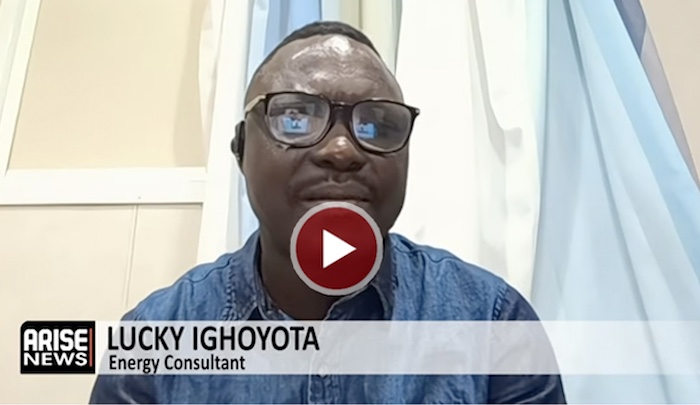

Energy consultant Lucky Ighoyota has called on the Federal Government to ensure full implementation of the Petroleum Industry Act (PIA) and maintain transparency in the $1 billion Hydrocarbon Pollution Remediation Project (HYPREP) as part of efforts to rebuild trust with the Ogoni people and restart oil production in the area.
In an interview with ARISE NEWS on Sunday, Ighoyota said President Tinubu’s recent clemency for the Ogoni Nine and Four marks a significant departure from the indifference that has characterised federal response to the Niger Delta crisis for decades. He recalled that the president had previously acknowledged environmental activist Ken Saro-Wiwa in his June 12 Democracy Day address, describing both actions as proof of Tinubu’s willingness to “heal old wounds” and foster a new era of peace and cooperation.
“While we appreciate the effort of Mr. President in trying to agree with the sentiments of stakeholders from the Niger Delta and Ogoni in particular, in healing the wounds that the Abacha regime meted on the people of Ogoni, having suffered that level of environmental degradation from Shell and its operations is a commendable effort,” Ighoyota said.
He emphasised that Tinubu’s gestures, though symbolic, must be backed by policy consistency, accountability, and genuine inclusion of Ogoni people in national development and oil governance but warned that Nigeria’s drive to boost crude oil output must not come at the expense of ecological justice or community trust.
“Beyond that, what is the framework for crude oil production resumption in that particular community? While we are targeting an upward movement of our crude oil and gas daily production, we must also be very, very careful,” he stated.
Ighoyota referred to the United Nations Environment Programme (UNEP) report of 2011, which documented severe contamination of land and water in Ogoniland, notimg that the Hydrocarbon Pollution Remediation Project (HYPREP), which was established to execute cleanup operations, had achieved significant results but still faced challenges. “Because the UNEP report that was sought around Ogoni in 2011, even though HYPREP, that is the Hydrocarbon Pollution Remediation Project, has done its bit in the first phase, there is a whole lot of remedial work that has taken place there. They have been able to achieve over 90% in the mangrove swamp recovery process by planting some of those mangrove plants, and also shoreline recovery. I think they’ve achieved over 50% around that, and also soil and groundwater remediation processes. They’ve also achieved about 30-something percent as of today while they’re doing the mid-term review.”
He noted that the project had amassed a billion dollars, but community members remained dissatisfied due to concerns over transparency and accountability. “A billion dollars was actually amassed for that project. In the framework itself, the community people aren’t too satisfied because of some concerns around transparency and accountability,” he revealed.
Ighoyota explained that if the government truly intends to resume oil production in Ogoniland, it must review its engagement strategies and address long-standing concerns around fairness and inclusion. “If government must push for resumption of crude oil production, then government will have to change its ways.”
He acknowledged recent government interventions in the wider Niger Delta region, including the crude oil securitisation policy, which engages private security firms such as Tantita Security Services and Pipeline Infrastructure Nigeria Limited (PINL) to protect pipelines, prevent illegal bunkering, and encourage community participation. However, he maintained that progress would be unsustainable without strict adherence to the Petroleum Industry Act (PIA) and equitable benefits for host communities.
“Beyond that, we must also try to look at the PIA, and how the PIA can be best implemented for the maximisation of the crude oil deposits in our country using Ogoni as a support community.”
Speaking on the controversy surrounding the presidential pardon, Ighoyota defended Tinubu’s decision, explaining that the president acted within his constitutional powers to offer clemency to the condemned activists, who were executed in 1995 during the Abacha regime.
“If the president deems it fit to say, okay, I’m using my presidential powers to offer clemency to everybody, I think he has that power.”
Ighoyota also urged Ogoni leaders and residents to embrace the renewed government initiatives, stressing that while past mistakes cannot be undone, future progress depends on cooperation and dialogue. “I want to appeal to the Ogoni people to cooperate with government. Since the land is already being attended to, efforts are already being carried out, even though there are shortcomings here and there, which is normal and traditional. That should be where everybody should be channelling their effort.”
He argued that Ogoniland has been largely inactive in crude oil production for more than 30 years, while other oil-producing communities have continued to contribute to Nigeria’s revenue base despite environmental risks. “Because since crude oil and gas production stopped there for years now, for almost 30 years plus now, other communities, other oil producing communities in Nigeria have been contributing to the national cause. Nobody’s seen anything around that. What has Ogoni contributed since then?”
Ighoyota further called attention to the global transition towards renewable energy, warning that the era of oil dependence may soon fade, saying that Nigeria must use the opportunity to maximise its crude oil potential responsibly while ensuring environmental and social justice for host communities. “There’s also this global push for energy transition, energy mix. Before you know it, the oil, which was the airline for a little while, the energy sector is transiting into renewables. So I want to appeal to the Ogoni people to cooperate with government.”
He concluded that all efforts should focus on effective action, with lasting policies, fair compensation, and full community involvement being central. “I think that should be where everybody should be channelling their effort towards that. I mean, that’s my position.”
Erizia Rubyjeana



